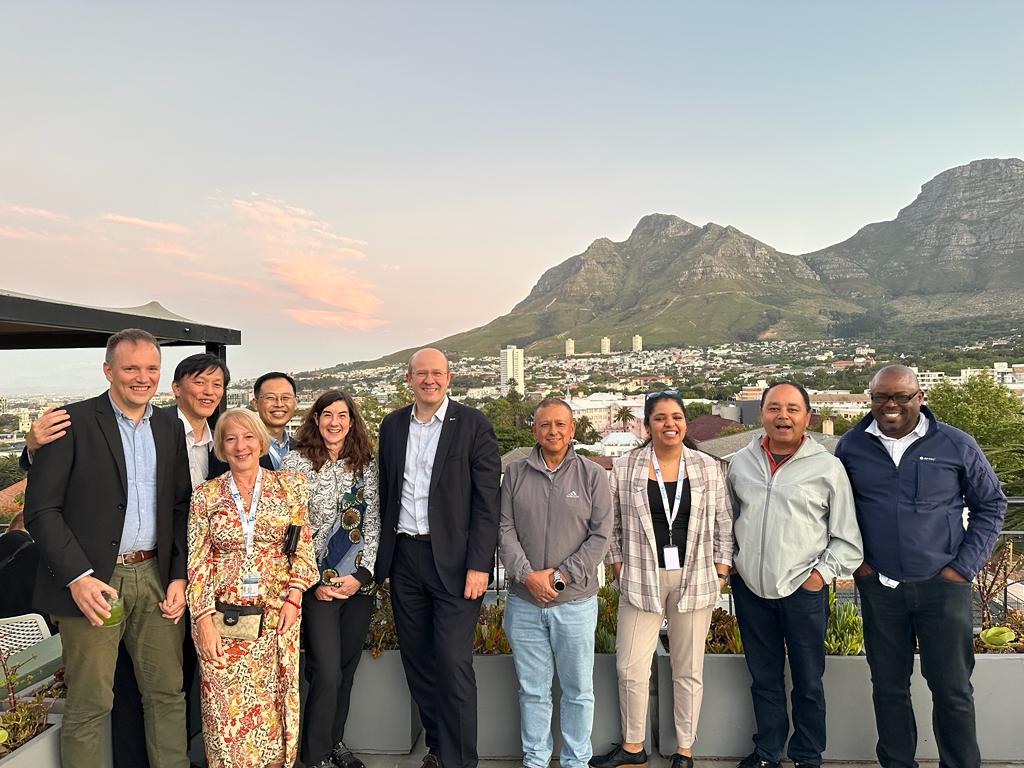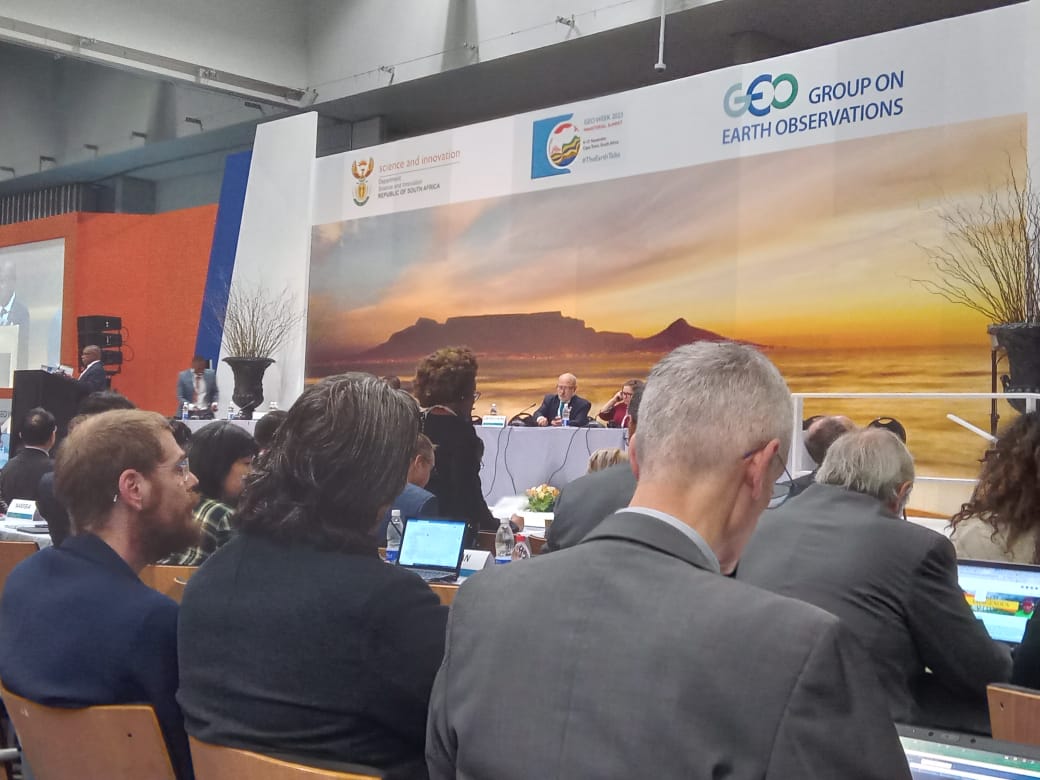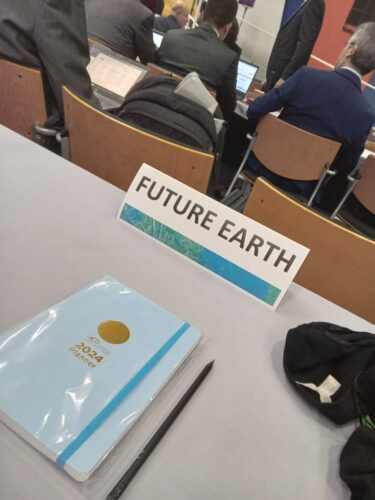Reflections from GEO Week 2023 and the Ministerial Summit: Earth Intelligence for All
In November 2023, the Group on Earth Observations (GEO) hosted GEO Week 2023 in Cape Town, South Africa. The five-day event brought together representatives from governments, international organizations, the commercial sector, civil society, and academia to debate and demonstrate how Earth observations (EO) may aid the global response to the Triple Planetary Crisis: Climate change, biodiversity loss, and pollution.
The meeting included side events, exhibitions, demonstrations, and field trips to showcase the rich and varied EO initiatives and activities, the GEO 19th Plenary Sessions, and the GEO Ministerial Summit.
GEO Plenary is GEO’s principal decision-making body, where members and participating organizations review the accomplishments of the GEO Work Programme and consider GEO’s future direction. At the 19th session it considered the vision post-2025 and the Cape Town Declaration that endorses GEO’s new strategy: to pursue global equity in EO, making resources and opportunities available to communities with varying needs and capacities; and to provide not only EO data but “Earth intelligence.”
Dr. Samantha Burgess, co-chair of the GEO Post 25 working group, emphasized that the GEO Strategy seeks to inspire and guide the work of the GEO community beyond 2025, while reaffirming its commitment to full and open access to Earth Observations (EO) data, knowledge and products, and the co-development of services that empower environmental decisions, enable economic opportunities, and promote good governance and highlighted two new commitments introduced in the Post-2025 Strategy.


The GEO Ministerial Summit is a high-level gathering to renew GEO Members’ and Participating Organizations’ commitment and support for the GEO vision and mission. During the Summit, ministers and senior officials endorsed the Cape Town Declaration and announced new initiatives and collaborations to improve the use and impact of EO for sustainable development.
Two key outcomes from the Plenary and the Ministerial Summit included the adoption and commitment of in-kind support of the post-2025 Strategy, and the recognition of the Global Ecosystems Atlas as a key tool to implement commitments under the Global Biodiversity Framework (GBF). The Global Ecosystem Atlas builds on existing initiatives and involves key players for biodiversity monitoring.
Additionally, the plenary supported bridging the gap between national, regional and global engagement through a strong National Coordination Mechanism (NCM), which is fundamental to GEO’s Post-2025 Strategy. It encouraged National GEOs to cooperate and leverage resources, with Secretariat support, to enhance their capabilities for mutual benefits and sustainability, and supported Secretariat efforts to strengthen low and middle income countries’ capacities to create and maintain robust NCMs.
Finally, GEO Week provided an opportunity for young people to discuss the use of EO to empower and engage early career researchers toward resolving global problems and reaching the Sustainable Development Goals.
 Future Earth recognizes GEO’s role in coordinating the observational community to address a variety of environmental and societal challenges, affording a close collaboration with the government agencies responsible for monitoring and tackling these challenges in each GEO Member State. Our community has collaborated with GEO on a number of GEO initiatives (see Future Earth’s Statement for GEO Week), including GEO BON, GEOGLOWS, GEO Mountains and AquaWatch.
Future Earth recognizes GEO’s role in coordinating the observational community to address a variety of environmental and societal challenges, affording a close collaboration with the government agencies responsible for monitoring and tackling these challenges in each GEO Member State. Our community has collaborated with GEO on a number of GEO initiatives (see Future Earth’s Statement for GEO Week), including GEO BON, GEOGLOWS, GEO Mountains and AquaWatch.
The partnership between ESA and Future Earth is a key mechanism by which Future Earth is building stronger links between EO research activities in our networks and GEO, by funding a program of EO activities to explore research avenues, build capacity and support the development of demonstrator tools. The Joint ESA-Future Earth Program supported the bioDISCOVERY workshop with GEO BON in June 2022.
Dr. Faten Attig Bahar, a member of Future Earth’s Governing Council, has been appointed as a liaison to the GEO post-2025 working group, which comprises 28 people chosen from the GEO community and partners based on the ideals of equity, diversity, and inclusion, and tasked to shape GEO’s new strategy.
DATE
January 18, 2024AUTHOR
Faten Attig-BaharSophie Hebden
SHARE WITH YOUR NETWORK
RELATED POSTS
Future Earth Experts Contribute to “10 Must Knows” as a Guide to Preserving Biodiversity
Sign the COP28 statement. The Science is Clear: We Need Net Zero Carbon Dioxide Emissions by 2050.
Future Earth at the UN 2023 Water Conference